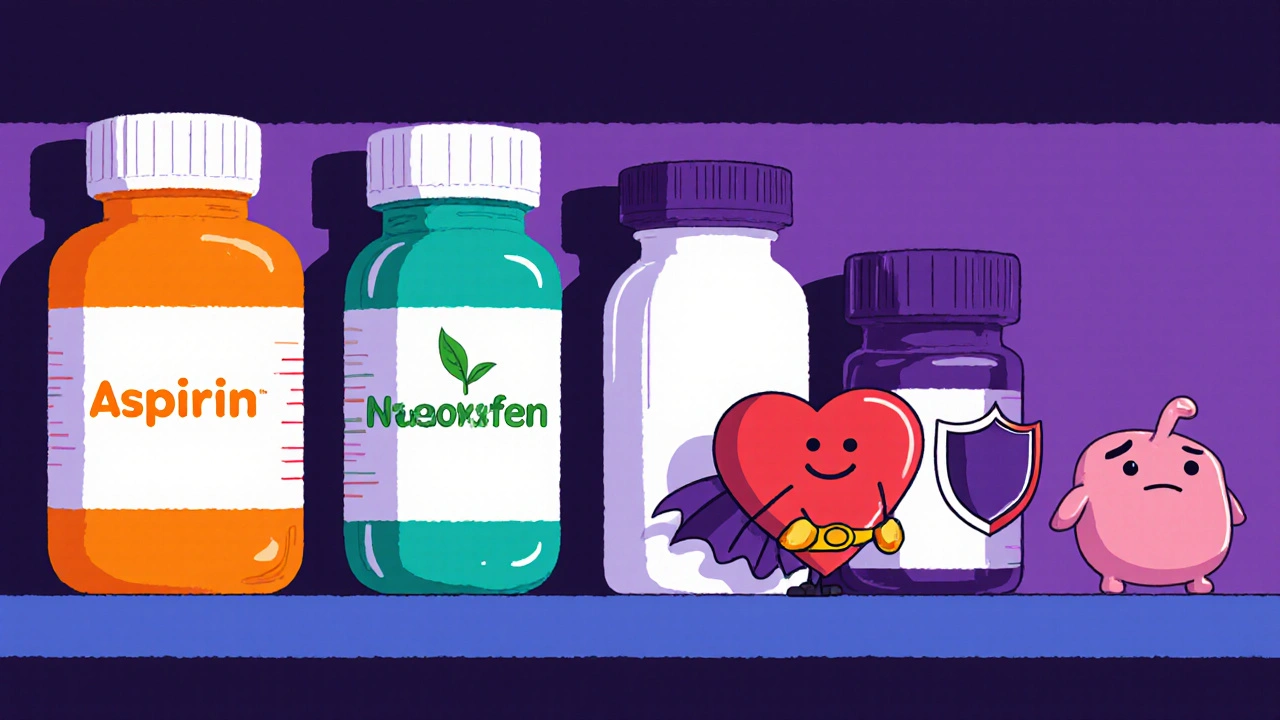Pain Reliever Selection Tool
Find Your Best Pain Relief Option
This tool helps you determine the most appropriate pain reliever based on your specific health situation and pain type. For severe or persistent pain, always consult a healthcare professional.
What type of pain are you experiencing?
When you reach for a painkiller, Aspirin is a salicylate drug known chemically as acetylsalicylic acid that’s been on pharmacy shelves for more than a century. If you’re wondering whether aspirin is right for you, read on - we’ll break down how it stacks up against the most common alternatives and highlight the situations where each shines.
Key Takeaways
- Aspirin works by irreversibly blocking COX‑1, making it excellent for heart‑health prevention but harsh on the stomach.
- Ibuprofen and naproxen are reversible COX inhibitors, offering strong anti‑inflammatory effects with a slightly lower GI risk.
- Acetaminophen provides pain relief without inflammation and is gentle on the gut, but it has a narrow safety margin for the liver.
- Celecoxib targets COX‑2 specifically, reducing inflammation while sparing the stomach, yet it carries a higher cardiovascular warning.
- Choosing the right option depends on your primary goal - pain relief, inflammation control, heart protection, or a combination.
What Is Aspirin?
Aspirin belongs to the class of drugs called non‑steroidal anti‑inflammatory drugs (NSAID). Discovered in 1897, its chemical name - acetylsalicylic acid - reflects its origin from the bark of willow trees. The drug is available over the counter in low‑dose (81mg) tablets for cardiovascular protection and higher doses (325-500mg) for relieving pain, fever, and inflammation.
How Aspirin Works
The core of aspirin’s action is its ability to inhibit the cyclooxygenase enzymes COX‑1 and COX‑2. By acetylating a serine residue in the active site, aspirin permanently deactivates COX‑1, which blocks the production of prostaglandins that cause pain, fever, and platelet aggregation. This irreversible inhibition explains why a single low‑dose tablet can thin the blood for up to a week.
Because COX‑1 also protects the stomach lining, long‑term aspirin use can erode the mucosa, leading to gastrointestinal bleeding. The trade‑off - reduced clotting versus higher stomach risk - is at the heart of the aspirin versus alternative debate.

Typical Uses and Benefits
- Cardiovascular prevention: Low‑dose aspirin is a cornerstone of secondary prevention after heart attacks or strokes.
- Acute pain relief: headaches, muscle aches, and minor arthritis flares respond well to standard doses.
- Fever reduction: aspirin’s antipyretic effect makes it a go‑to for sudden fevers (though not recommended for children due to Reye’s syndrome).
Risks and Side Effects
While aspirin’s benefits are clear, its side‑effect profile limits its use for some people:
- Gastrointestinal (GI) bleeding: Up to 1 in 100 regular users experience ulcers or bleeding, especially when combined with alcohol or steroids.
- Allergic reactions: Some patients develop asthma‑like symptoms known as aspirin‑intolerant asthma.
- Reye’s syndrome: Children and teenagers recovering from viral infections should avoid aspirin.
- Kidney impact: High doses can reduce renal blood flow, which matters for patients with chronic kidney disease.
Major Alternatives to Aspirin
Below are the most common stand‑ins, each with its own mechanism, strengths, and caveats.
Ibuprofen
Ibuprofen is a reversible NSAID that blocks both COX‑1 and COX‑2 temporarily. It’s sold in 200mg tablets and works well for pain, inflammation, and fever. Because the inhibition isn’t permanent, the GI risk is lower than with aspirin, but it still exists, especially at doses above 1200mg per day.
Naproxen
Naproxen offers a longer duration of action (8‑12hours) and similar reversible COX inhibition. It’s often chosen for chronic conditions like osteoarthritis. Its GI profile is comparable to ibuprofen, but the longer half‑life can increase the chance of stomach irritation if taken without food.
Acetaminophen (also known as paracetamol)
Acetaminophen works mainly in the central nervous system, reducing pain signals without significant anti‑inflammatory effects. It does not inhibit COX enzymes in the gut, so it’s gentle on the stomach. The major downside is liver toxicity: daily intake above 3g for adults can cause irreversible damage, especially when combined with alcohol.
Celecoxib
Celecoxib is a selective COX‑2 inhibitor, meaning it spares COX‑1 and thus reduces stomach irritation. It’s prescribed for arthritis and acute pain when NSAID‑related GI issues are a concern. However, COX‑2 suppression can shift the balance toward clot formation, raising cardiovascular risk for patients with existing heart disease.
Side‑by‑Side Comparison
| Attribute | Aspirin | Ibuprofen | Naproxen | Acetaminophen | Celecoxib |
|---|---|---|---|---|---|
| Mechanism | Irreversible COX‑1/COX‑2 inhibition | Reversible COX‑1/COX‑2 inhibition | Reversible COX‑1/COX‑2 inhibition (longer half‑life) | Central COX‑3 modulation (minimal peripheral effect) | Selective COX‑2 inhibition |
| Typical OTC dose | 81mg (cardio) / 325‑500mg (pain) | 200‑400mg every 4‑6h | 220‑250mg every 8‑12h | 500‑1000mg every 4‑6h (max 4g/day) | 100‑200mg twice daily (prescription) |
| Onset of relief | 30‑60min | 15‑30min | 30‑60min | 30‑60min | 1‑2h |
| Duration of action | 4‑6h (pain) / 7‑10days (platelet effect) | 4‑6h | 8‑12h | 4‑6h | 12‑24h |
| GI bleeding risk | High (especially chronic use) | Moderate | Moderate‑high | Low | Low |
| Cardiovascular impact | Protective at low dose, risky at high dose | Neutral to slight increase at high dose | Neutral | Neutral | Potential increase in thrombotic events |
| Liver toxicity | Low | Low | Low | High (overdose) | Low |
| OTC availability | Yes (low dose & regular) | Yes | Yes | Yes | No (prescription in most countries) |
How to Choose the Right Option for You
Think of the decision as a simple checklist. Ask yourself these questions before reaching for the bottle:
- Is inflammation the main problem? If swelling is dominant, ibuprofen or naproxen (both reversible NSAIDs) generally outperform aspirin.
- Do you need heart‑protective benefits? Low‑dose aspirin remains the evidence‑based choice for secondary prevention after a heart attack.
- Is your stomach sensitive? Switch to acetaminophen or celecoxib (if prescribed) to avoid GI irritation.
- Are you drinking alcohol regularly? Combine alcohol with acetaminophen or aspirin? Avoid; both increase liver or stomach risk.
- Do you have liver disease? Skip acetaminophen; opt for an NSAID with a protective stomach coating (e.g., ibuprofen with food).
For most healthy adults dealing with occasional headache or minor muscle pain, ibuprofen offers the best mix of speed, efficacy, and safety. If you’re already on a low‑dose aspirin regimen for heart health, keep it low and add a separate NSAID only under a doctor’s guidance.
Frequently Asked Questions
Can I take aspirin and ibuprofen together?
Generally, it’s not recommended because ibuprofen can interfere with aspirin’s antiplatelet effect. If you need both, take aspirin at least 30minutes before ibuprofen and only under medical advice.
Why does aspirin cause stomach ulcers?
Aspirin permanently blocks COX‑1, the enzyme that helps produce protective prostaglandins in the stomach lining. Without those prostaglandins, the gastric mucosa becomes vulnerable to acid.
Is acetaminophen safer than aspirin for kids?
Yes. Aspirin is linked to Reye’s syndrome in children, a rare but serious liver condition. Acetaminophen doesn’t carry that risk, though dosing must stay within safe limits.
When should I consider a prescription NSAID like celecoxib?
If you have chronic arthritis and have struggled with stomach irritation from traditional NSAIDs, a COX‑2 selective drug can provide relief while sparing the gut. It requires a doctor’s prescription because of cardiovascular warnings.
How long does aspirin’s blood‑thinning effect last?
Because aspirin irreversibly disables platelets, the effect lasts for the life of each platelet-about 7‑10days. That’s why doctors advise stopping aspirin a week before surgery.
Bottom line: no single painkiller fits every scenario. By understanding how aspirin works alongside its peers, you can pick the agent that matches your health profile and the type of pain you face. When in doubt, a quick chat with your pharmacist or doctor can prevent unwanted side effects and keep you on the right track.




Tom Green
October 17, 2025 AT 17:14Hey folks, if you’re sorting through painkillers, start by asking what you need most – quick relief, inflammation control, or heart protection. Aspirin’s irreversible COX‑1 block is great for platelets but can really chew up the stomach lining over time. For occasional headaches, ibuprofen or naproxen usually give faster knock‑down with a lower bleed risk. Just remember to pair NSAIDs with food if your gut is sensitive.
Emily Rankin
October 27, 2025 AT 12:21Imagine the orchestra of chemistry inside your body, each drug a different instrument playing its part in the symphony of pain relief. Aspirin steps onto the stage with a dramatic, irreversible note, silencing COX‑1 forever and giving your blood a smoother flow, a heroic solo for heart health. Yet, that same bold chord can bruise the delicate lining of your stomach, turning a protective melody into a discordant ulcer.
Enter ibuprofen, a quick‑silver violinist, striking the strings of COX‑1 and COX‑2 with reversible grace, delivering swift relief without lingering damage – but still whispering a warning to the gut if you overplay it.
Then there’s naproxen, the low‑brow bass, holding the tempo for hours, perfect for chronic aches yet demanding respect for its longer half‑life.
Acetaminophen, the gentle harp, plucks pain signals in the brain without stirring inflammation, a soft lullaby for the stomach but a potential nightmare for the liver if the volume turns up too high.
Celecoxib, the avant‑garde saxophonist, targets COX‑2 exclusively, sparing the gastric mucosa while still grooving through inflammation, though it sometimes drafts a risky cardiovascular riff.
Each of these compounds offers a unique refrain, and the best choice depends on the audience – your body’s current state, medical history, and the specific pain you’re trying to silences.
For a healthy adult with a simple tension headache, the swift overture of ibuprofen often outshines aspirin’s lingering brass.
If you’ve already been prescribed low‑dose aspirin for heart protection, keep that regimen low and consult a physician before adding any other NSAID to the mix.
Remember, alcohol is a mischievous conductor that can amplify the hepatotoxicity of acetaminophen or the gastric irritation of aspirin, so tread carefully.
Kidney function, too, can be compromised by high‑dose NSAIDs; a quick check of your renal health can prevent a silent decline.
When chronic arthritis enters the scene, the longer act of naproxen or the tailored COX‑2 melody of celecoxib may provide sustained relief without constant re‑dosing.
Always consider the timing of aspirin’s antiplatelet effect – a single low dose can thin your blood for a full week, something surgeons dread when you plan an operation.
And never give aspirin to kids with viral infections; the risk of Reye’s syndrome is a dark, avoidable climax.
In the end, the art of pain management is a balance of efficacy, safety, and personal physiology – a composition you can fine‑tune with guidance from your healthcare team.
Rebecca Mitchell
November 6, 2025 AT 08:27Aspirin is fine but you really need to watch your stomach it can bleed fast. Also don’t mix it with alcohol.
CHIRAG AGARWAL
November 16, 2025 AT 04:34Honestly, most of these pills are overhyped – you can often manage pain with ice and rest instead of popping a whole bottle.
Patricia Echegaray
November 26, 2025 AT 00:41What the pharma giants don’t tell you is that aspirin is a covert tool to keep the population docile, thinning the blood so they can’t fight back. It’s no coincidence that the same labs push COX‑2 blockers while burying natural anti‑inflammatories.
Miriam Rahel
December 5, 2025 AT 20:47While the aforementioned commentary raises intriguing points, it is essential to adhere to evidence‑based guidelines. Aspirin’s role in secondary cardiovascular prevention is well‑documented, with randomized controlled trials confirming its efficacy. Conversely, the gastrointestinal risks are quantifiable, warranting co‑prescription of proton‑pump inhibitors in high‑risk cohorts. A balanced assessment, therefore, recommends individualized therapy predicated upon patient comorbidities and risk profiles.
Samantha Oldrid
December 15, 2025 AT 16:54Sure, aspirin’s great if you enjoy surprise stomach bleeds.
Carissa Padilha
December 25, 2025 AT 13:01While that sarcasm might land for some, the reality is that many people rely on aspirin daily, oblivious to the silent threat of GI erosion unless they read the fine print. It’s not just a punchline; it’s a legitimate health concern that warrants monitoring and, in many cases, protective measures such as PPIs.
Alexis Howard
January 4, 2026 AT 09:07People keep acting like ibuprofen is the holy grail it isn’t just a magic fix no one will ever be perfect
Kevin Adams
January 14, 2026 AT 05:14Behold! The drama of our modern pharmaco‑theatre! Aspirin storms the stage with irreversible vigor, whilst ibuprofen tiptoes in with reversible charm! Naproxen lingers like a brooding protagonist, refusing to exit the scene for hours! Acetaminophen whispers sweet nothings to the brain, sparing the gut, yet lurking with a lethal liver plot twist! Celecoxib, the enigmatic anti‑hero, promises a gut‑safe saga but hides a cardiovascular sting! The audience, our frail bodies, must discern which act to applaud!
Steve Holmes
January 24, 2026 AT 01:21Hey all, just wanted to add that rotating between ibuprofen and naproxen can sometimes keep tolerance low and reduce stomach upset, especially if you take them with food. Also, keep an eye on your total daily acetaminophen dose – it’s easy to exceed the limit if you’re popping combo meds.
Roberta Makaravage
February 2, 2026 AT 21:27Great points, Steve! 👍 Just a reminder: always check the label for hidden caffeine or other additives that can stress the liver. And if you’re on chronic therapy, a periodic liver panel is wise. 💊📈
Lauren Sproule
February 12, 2026 AT 17:34Appreciate the shared tips, everyone. Let’s keep the conversation friendly and remember that individual responses vary. If anyone’s unsure, a quick chat with a pharmacist can clear up a lot of confusion.
Malia Rivera
February 22, 2026 AT 13:41While camaraderie is nice, the truth remains that many of these drugs are tools of a larger agenda to keep the populace compliant. Selecting a painkiller isn’t just about comfort; it’s about sovereignty over your own body.